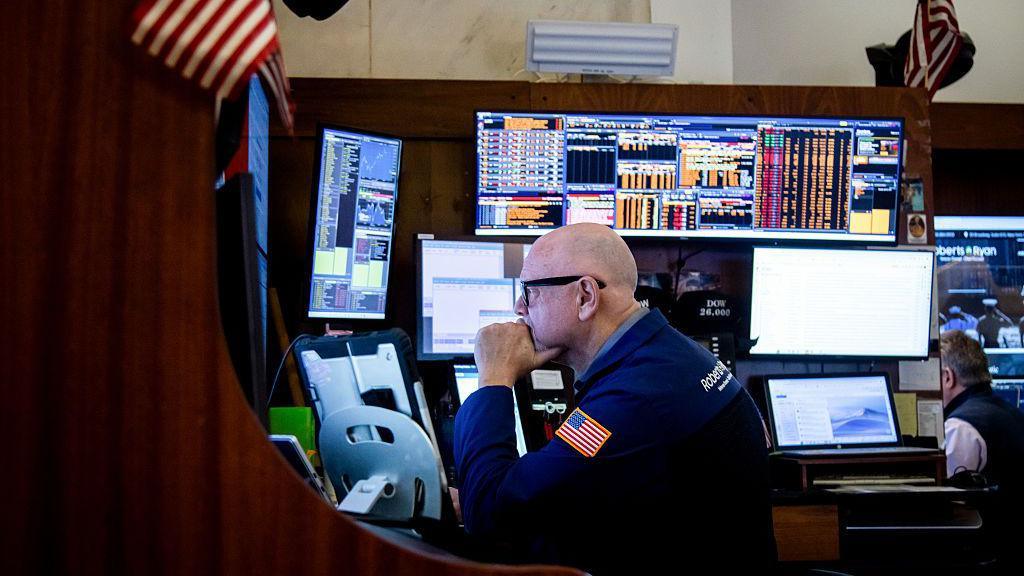As a former champion runner, Richard McDonald can move quickly.
But the speed of the market falls, triggered by the sweeping global tariffs Donald Trump announced last week, still kept him on his toes.
Previously a trader for Credit Suisse, he now buys and sells stocks privately. At his laptop in London last week, he watched as the president unveiled a poster board outlining tariff rates, some as high as 50%, for imports from countries around the world.
He raced to understand which companies might be worst hit. Then he sold.
“There are billions being wiped off share prices every second, so it’s really ‘fastest finger first’,” he said. “My mind was sprinting.”
In 25 years of trading, he said he had rarely experienced anything like it.
Trillions were wiped off the value of financial markets around the world in the aftermath of Trump’s “Liberation Day” announcement.
Leading share indexes in the US and UK saw some of the steepest declines since the onset of the Covid-19 pandemic, dropping more than 10% over three days.
Oil prices sank and so did the dollar.
By Wednesday, the worries had spread to the bond market, as investors started dumping US government debt, usually a safe haven for investors in times of uncertainty.
When Trump announced he was putting some of the most eye-watering tariffs on pause, shares stopped sliding and rallied.
But the market turmoil was far from over.
Trump left in place a tariff of 10% on imports from most countries and a tariff of 145% on goods from China, America’s third largest source of imports after the European Union and Mexico.
A day after the announcement, the S&P 500 dropped another 3.5%, the Dow slid 2.5% and the Nasdaq fell 4.3%.
At St Louis-based Argent Capital Management, the mood, said portfolio manager Jed Ellerbroek, was “still miserable”.
Some of his firm’s holdings, like health insurance giant United Healthcare, have done well over the last week, as investors look for companies likely to be able to weather the tariff storm.
But his third largest investment is Apple, which makes the majority of its iPhones and other products in China.
“Trump has induced a gigantic amount of uncertainty into the global economy and consumers and investors and business managers are reeling and unable to make long-term decisions,” Mr Ellerboek said.
“We are really on hold, because we only trade when we have high conviction levels,” he said.
“What do we do with Apple? I don’t know. I’m not going to change when I have no clue what the tariff rate is going to be next week,” he said.
Faced with so many uncertainties, some investors are simply quitting the market, said John Canavan, lead analyst at Oxford Economics.
“What you’re looking at, broadly speaking, is a market that is frustrated, uncertain and confused about where we’re going to be one day to the next,” he said. “In that environment you have a tendency to see some investors choosing the safety of cash.”
While Trump’s tariff rollback was a “relief”, he said it did not change the bigger picture: firms in the US that are bringing in parts or products are facing significantly higher import taxes than they were at the start of the year.
“The tariffs that remain are still high enough that they are likely to push up inflation and weigh significantly on the economy as we go forward,” he said.
“We’re just back trading again on the broader long-term outlook of the tariff implications, which is still negative.”
Donald Trump’s return to the White House has created flashpoints between the North American neighbours.
Nayib Bukele has won praise from Donald Trump for imprisoning some “very bad people” deported from the US.
The meeting comes after the Trump administration mistakenly deported a Maryland resident due to an ‘administrative error.’
President Trump says Chinese-made electronics are simply moving to a different levy “bucket”.
Doctors also found Trump has scarring “on the right ear from a gunshot wound”, after last July’s assassination attempt.

